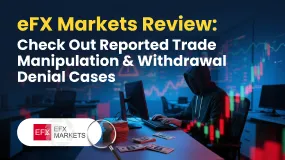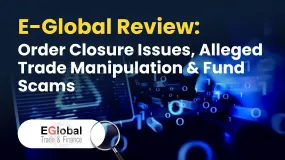Abstract:Sometimes, the reliability of a forex broker may not be easily proven. A forex broker could be established and reputable, and possess a legitimate regulatory status with valid licenses, but it plays with the loopholes within the trading platforms to take advantage of its trading clients.

Here is a list of some common methods that forex brokers used to capitulate their trading clients' funds in a subtle and not easily identifiable way:
Trap 1: Disrupting trading platforms
Some forex brokers occasionally cause disruptions to their trading platforms to trap their trading clients. This is because forex brokers make money from two main sources, which are clients' deposits, and the volume of trades made by clients. When they disrupt the trading platforms, many traders can incur unnecessary losses and some might even blow their entire trading accounts if they are not skilled enough.



Trap 2: Sudden increase of spreads
Generally, floating spread size will change due to different market conditions, which is a normal situation in forex trading. However, some forex brokers suddenly increase the spread sizes of clients without any warning. This can increase the chances of traders' hitting their stop losses and thus losing money a lot quicker and easier.


Trap 3: Unable to place or amend orders
Similar to the aforementioned trap #1, traders might have issues with placing and/or amending their orders during live market hours. This could affect their ongoing trades or new trades that are yet to be placed. This could be detrimental for traders that do not have a habit of setting a predetermined cut loss as some of them make decisions as they watch the market. In a fast-moving market, when traders are unable to place and/or amend their orders, they could potentially suffer losses beyond their personal expectations and risk tolerance.
Trap 4: Manipulation through copy trading services
Conventionally, when a trader engages the service of a copy trading service, they can still have full access to their trading accounts. Nevertheless, some forex brokers take control over these accounts by forbidding traders to make any amendments to their trading accounts as soon as they start copy trading. These forex brokers then collaborate with “master forex traders” and start overtrading or trading recklessly as they only focus on increasing the trade volumes on the platform instead of helping the client to make profits. This is a widely used tactic by malicious forex brokers at the expanse of their clients' trading accounts.

Read this real-life case that was reported by a trader on WikiFXs Exposure page as his broker stopped him from amending and closing a losing trade, as well as withdrawing his funds, which then made him lose all the funds in his account: https://www.wikifx.com/en/newsdetail/202207042224723100.html.
In conjunction with this, it is important to look at the Exposure section on the WikiFX app (if you have not downloaded this app, get it now for free on Google Play/App Store) where traders from around the globe post their honest reviews and transparent complaints about their forex brokers respectively. This is where you can get a better and more straightforward understanding of a forex brokers reliability.


Here is another way you could look at the Exposure pieces of a specific forex broker:
Type in the name of the forex broker in question into the WikiFX search bar. For easy illustration purposes in this article, we will use a broker named “FXTM” as an example:

Open up its profile. The Exposure button is located at the bottom of its profile page.























